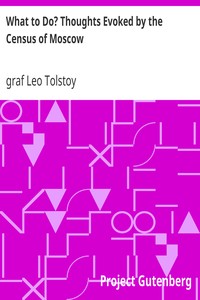What to Do? Thoughts Evoked by the Census of Moscow by graf Leo Tolstoy
"What to Do? Thoughts Evoked by the Census of Moscow" by graf Leo Tolstoy is a reflective essay written during the late 19th century. In this treatise, Tolstoy explores the social implications and moral responsibilities associated with conducting a census in Moscow, encouraging a deep examination of societal conditions and the human experience related to poverty and suffering. At the start of the essay, Tolstoy recounts his shock at witnessing the stark
poverty in Moscow after moving from the countryside. Through encounters with beggars and the systemic issues of urban life, he contemplates the disconnection between the wealthy and the suffering classes. He highlights individuals who live in dire conditions, raising questions about societal indifference and moral obligation. As Tolstoy reflects on the gathering of census data, he emphasizes that the process should not merely catalog the suffering but should also embody a call to action, urging those involved to engage with the lives behind the statistics and foster human connection rather than mere observation. His argument sets the stage for a broader discourse on empathy, social justice, and the responsibility of individuals towards those in need. (This is an automatically generated summary.)
Read or download for free
| How to read | Url | Size | |||
|---|---|---|---|---|---|
| Read now! | https://www.gutenberg.org/ebooks/3630.html.images | 483 kB | |||
| EPUB3 (E-readers incl. Send-to-Kindle) | https://www.gutenberg.org/ebooks/3630.epub3.images | 263 kB | |||
| EPUB (older E-readers) | https://www.gutenberg.org/ebooks/3630.epub.images | 268 kB | |||
| EPUB (no images, older E-readers) | https://www.gutenberg.org/ebooks/3630.epub.noimages | 243 kB | |||
| Kindle | https://www.gutenberg.org/ebooks/3630.kf8.images | 512 kB | |||
| older Kindles | https://www.gutenberg.org/ebooks/3630.kindle.images | 489 kB | |||
| Plain Text UTF-8 | https://www.gutenberg.org/ebooks/3630.txt.utf-8 | 462 kB | |||
| Download HTML (zip) | https://www.gutenberg.org/cache/epub/3630/pg3630-h.zip | 259 kB | |||
| There may be more files related to this item. | |||||
Similar Books
About this eBook
| Author | Tolstoy, Leo, graf, 1828-1910 |
|---|---|
| Translator | Hapgood, Isabel Florence, 1850-1928 |
| Title | What to Do? Thoughts Evoked by the Census of Moscow |
| Contents | On Women -- On Labor And Luxury |
| Credits | Transcribed from the 1887 Tomas Y. Crowell edition by David Price |
| Reading Level | Reading ease score: 59.7 (10th to 12th grade). Somewhat difficult to read. |
| Language | English |
| LoC Class | HN: Social sciences: Social history and conditions, Social problems |
| Subject | Social problems |
| Subject | Moscow (Russia) -- Social conditions |
| Category | Text |
| EBook-No. | 3630 |
| Release Date | Jan 1, 2003 |
| Most Recently Updated | Mar 19, 2013 |
| Copyright Status | Public domain in the USA. |
| Downloads | 269 downloads in the last 30 days. |
| Project Gutenberg eBooks are always free! | |

